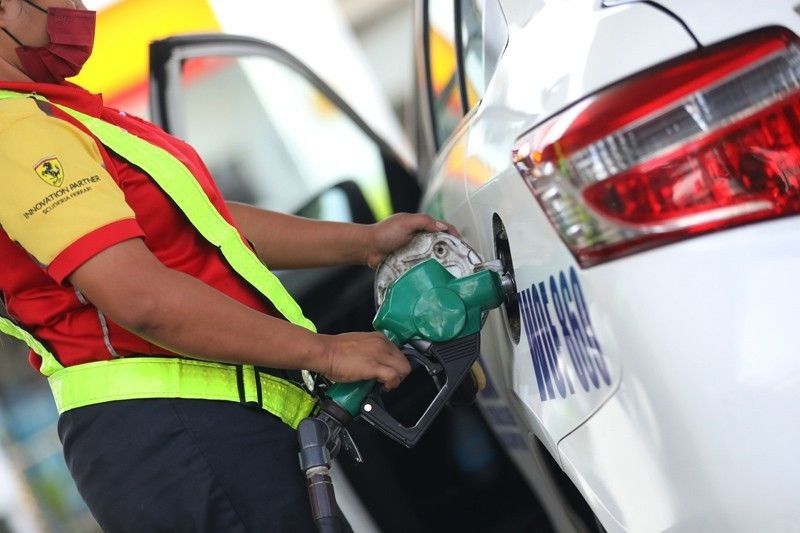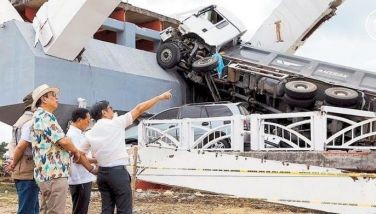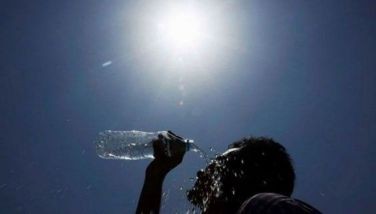Philippines not facing oil supply issues, DOE assures lawmakers

MANILA, Philippines — (Updated 5:00 pm) The Department of Energy said anew on Monday that the Philippines is not experiencing any oil supply issues as local oil firms announced yet another round of price hikes driven in part by Russia's invasion of Ukraine.
The energy department said, however, that the rising prices are a cause for concern and should prompt a review of oil deregulation, which has relied on competition among oil firms to keep prices stable.
"We don't have any problems with supply. We're covered by our inventory [which has reserves that can last for] 30, more than 40 days," Energy Undersecretary Gerardo Erguiza told lawmakers in Filipino at a House hearing on the fuel price increases.
Private firms are in charge of maintaining their oil inventories, he said.
"We have that assurance from the companies that they don't have any problem with their contracts and that they have sufficient supply, as of now, and their inventory is being maintained. The problem is the pricing [of oil]," Erguiza said, referring to the sustained oil price hikes since the start of the year.
Pump prices rose for the tenth consecutive time this week, registering the largest increases to date, since the start of 2022. Gasoline rose by P3.60 per liter; diesel went up by P5.85 per liter; and kerosene climbed by P4.10 per liter, according to a Seaoil Philippines advisory.
The DOE said it is currently conducting a feasibility study on having a "strategic petroleum reserve" or oil stockpile, which would be managed by the state-run Philippine National Oil Co. (PNOC).
Sen. Manny Pacquiao, who is running for president in this year's elections, said in a Monday statement that the DOE, which handles PNOC, should have had the foresight to create a national oil stockpile which will act as a buffer that can stabilize oil prices. Citing the PNOC's amended charter, he said the state-run firm is supposed to "provide and maintain an adequate and stable supply of oil and petroleum products for the domestic requirement."
Meanwhile, Energy Secretary Alfonso Cusi earlier said the country is not experiencing any oil supply disruptions at the moment, but urged the public to conserve on the use of petroleum and electricity for the time being.
"We want government interventions whenever there is an increase in oil prices. The root of all these problems is oil deregulation," Erguiza said during the Monday hearing.
The DOE wants Congress to amend the Oil Deregulation Act of 1998 to give the agency powers to intervene when there is a spike in global oil prices, such as unbundling the cost of petroleum retail products to reflect their true and passed-on charges.
Calls to suspend fuel excise taxes
On Monday, Sen. Risa Hontiveros joined calls urging the government to suspend the collection of fuel excise taxes.
The Tax Reform for Acceleration and Inclusion (TRAIN) law, raised excise taxes on petroleum products in three tranches beginning 2018. The excise tax for gasoline now stands at P10 per liter, P6 per liter for diesel, and P5 per liter for kerosene.
Under the law, petroleum excise taxes may only be halted if the average price of Dubai crude oil hits or exceeds $80 a barrel over a three-month period.
"We have long been burdened by the weight of the excise taxes on petroleum under the TRAIN Law," Hontiveros said in a statement posted on the Senate's website on Monday.
Citing industry data, the lawmaker said that the Philippines consumes some 400,000 barrels of oil every day.
Vice President Leni Robredo and Sen. Panfilo "Ping" Lacson — who are both running for president — made similar calls to halt the collection of excise taxes on petroleum products.
READ: Bets reveal plans to tackle high oil prices as inflation worries voters
Late last year, the House Ways and Means panel approved a bill that would immediately suspend the collection of excise taxes on diesel, kerosene and liquified petroleum gas (LPG) for six months, or until the Mean of Platts Singapore — the pricing yardstick for refined oil products in Southeast Asia — declines to $65 per barrel for four straight weeks.
The measure also seeks to put an excise tax cap of P4.35 per liter on low-octane gasoline until the proposed excise tax suspension is lifted.
READ: House panel approves bill suspending oil excise tax collection
Meanwhile, Sen. Nancy Binay called on the DOE to instead focus on securing enough power reserves in time for the national and local elections on May 9.
"Rather than looking too far ahead, the energy department should look at the problem that's staring them in the face. We should focus on the immediate problem which has been systemic. Right now, we are studying in the meantime [on whether or not] to suspend excise taxes on petroleum," she said in a separate statement on Monday.
"It would be a big threat to elections if we have a series of brownouts during the week of the polls. What we need is an immediate response and practical solutions to the back-to-back power crisis scenario," she added.
Binay said the DOE should fast-track the building, testing and commissioning of new power plants, and start exploring viable renewable enrgy resources which can tide over the gaps in power supply.
The grid operator earlier warned of thin operating margins — or power in excess of demand — in the Luzon grid during the summer season, which includes the critical elections day, due to increased demand.
- Latest
- Trending































